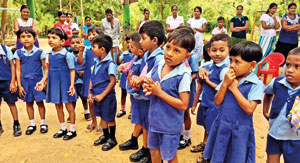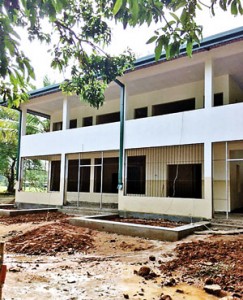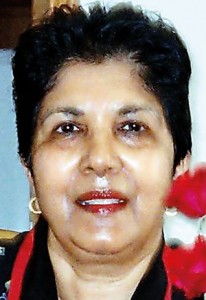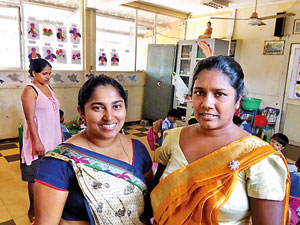It all started with a pre-school

Song and action: The little ones sing watched by their parents
Mahavilachchiya, some 40 km from Anuradhapura looks tranquil in the early light- sun dappled fields where peacocks roam, but not so long ago, this border village faced the brunt of long years of war. Emerging from those decades of conflict has not been easy for this farming community.
It is a long way from home for Lovina Charles but for more than ten years now she has been travelling with unfailing enthusiasm from Thalawathugoda on the outskirts of Colombo to Mahavilachchiya to see the children she is helping.
It was her daughter Marissa volunteering to teach English to the children of Mahavilachchiya in 2004 at the height of the war for three months, who after seeing the hardships suggested to her own parents then living in the UK that they build a school there. It was an idea that Lovina was quick to take up, remembering her own happy schooldays at Holy Family Convent, Bambalapitiya.
The family had been living in the UK for 50 years, far removed from the tensions and trauma of war. Lovina herself, born in India had grown up in Colombo and moved to the UK when she was 19 to study nursing. She met her husband Chas Charles, a young engineer there and they raised their three children in London.
But since returning to Sri Lanka ten years ago, the Mahavilachchiya project has been her greatest concern. Having set up the Charles Education Center, a registered charity in the UK, Lovina began the daunting task of raising funds and making the school a reality. They bought a plot of land and built a two-storeyed building which would serve as a pre-school for the children of the area to begin their education.
Thus began the ‘Mahavilachchiya Education Center for Children (Guarantee) Ltd’ with a single two-storey building constructed in 2005 to house the Montessori. That initial vision has since expanded vastly – now older children come in, in the afternoons to learn English and Tamil and there are plans for much more- a full-fledged IT lab, vocational training centre and playground (see box). Another two-storey building is now nearing completion to house all these activities.

Almost ready: The new building
There were disruptions and setbacks initially, but ten years later, the benefits to the community are evident. Chirpy pre-schoolers are at their tables busy with their workbooks when we visit, monitored with much affection by two efficient teachers.
Since 2007, the building’s upper floor has been occupied by On-Time, a company set up by the John Keells Foundation in collaboration with the Foundation for Advancing Rural Opportunity (FARO). This is Sri Lanka’s first rural BPO (Business Process Outsourcing) operation, outsourcing some of JKH’s accounting functions and on the CSR front, offering village youth training and employment. On Time currently employs 20 young women from the village. Its bright young CEO Nadeeka Karunasena, 31, has been there since its inception and says the village girls do not need to look for jobs in garment factories- they have something they can do close to home. Married with a young daughter who attends the Montessori, she has not forgotten the horrors of the war and is glad her little one can grow up in an atmosphere of peace and hope.
On weekends ICT instructor Sisira Rajapakse is the man in demand as the youngsters eagerly await his classes. “They call me even when I’m sleeping asking me to come and teach,” he smiles. There are also students offering ICT for the O’Ls and he has conducted classes on request at the school for members of the Police and Civil Security Department, he says.
Lovina has identified this need for computer skills and the new building now nearing completion opposite the original one will have a well-equipped IT lab with more laptops and multimedia facilities. There are plans to formalise the ICT training and get it registered so that the students could earn a certificate at the end of the course. Vocational training in plumbing, welding, carpentry, sewing etc are also planned. She has enlisted the help of MAS Active to train young girls in sewing while the Hayleys Group which has been helping in many ways, will begin an agricultural project whereby villagers will benefit through learning improved farming techniques, as their CSR contribution.
The Montessori will move to the new building, airy and spacious, to meet the increasing demand (expanding from 33 kids to 50) and Lovina is now setting up the creche they plan to start on the ground floor so the young mothers of the community will be well served.
Indeed the mothers and grandmothers have been her staunch supporters all along. Fully involved in the running of the school, they take it in turns to come in every morning to get the school swept and tidied and make a nourishing kola kenda for their little ones’ morning snack. “Even the picky eaters eat when they see their friends eating,” says one mother.
It is heartening to see the children singing nursery rhymes and songs in all three languages- Sinhala, Tamil and English, dressed in their blue uniforms, some clutching their friends’ hands or stepping forward on their own to sing and recite. They are now preparing for their annual year-end concert, say teachers Galbaduwa Thanthirige Sudharshani Thusharika Madushani and Bentara Gurunnanselage Vindya Sanjeewani.

Lovina Charles: Reaching out to a community in need
It is a farming community dependent on the harvest and the vagaries of the weather, and attendance falls sometimes when parents are occupied with their harvest, but they realise the value of sending their little ones to Montessori regularly, says Sudharshani.
Back in the days when she lived in London, Lovina would help out at an elders’ home and take her three children there often to spend time with the old folks. For her now, the satisfaction is in seeing this community she has become so close to have something they can take forward themselves as their own. “It was always my desire to help,” she says and she’s not stopping now.
| A place to playThe large neglected playground next to the school is where the youth from the village gather every day to play despite the uneven ground and thick undergrowth. Seeing the potential to develop it so that they could enjoy their beloved cricket and other sports, Lovina has put forward a proposal to the Minister of Sports. “Currently there are between 50-60 youths on a daily basis using the ground. The playground is essential in the mental, physical and social development of the youth of the village as it is the only resource available to them for any kind of sports activity or recreation,” she says in her project proposal. After obtaining the necessary permits, the playground (1.4 hectares) which belongs to the government has now been cleared but needs to be levelled with proper drainage installed. The boys are desperately keen to have a cricket ground and Lovina has already received donations of cricketing equipment and a sponsor for a sports co-ordinator. Plans drawn up after discussion with the villagers include volleyball and netball courts and Lovina hopes the Ministry and others will soon step in to support it. |
The project needs help- new furniture and fittings for the montessori, computer tables for the IT section and more. A unit that can accommodate teachers and volunteers is another dream to help the children of Mahavilachchiya.
For more information contact mhvedu@hotmail.com or see www.charleseducationcenter.org or www.facebook.com/charleseducationcenter

Sudharshani and Vindya: The two dedicated pre-school teachers


